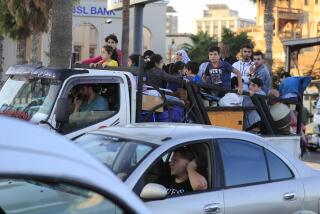Libyan fighting spills into Tunisia
- Share via
Reporting from Benghazi, Libya — Fighting in western Libya spread into neighboring Tunisia, where the government Friday condemned the shelling of its territory and the official press agency reported more than a dozen trucks carrying forces loyal to Moammar Kadafi had crossed the border.
In addition, the North Atlantic Treaty Organization accused Kadafi forces of laying mines in the harbor near the besieged Libyan city of Misurata, where rebels have ousted pro-regime forces and rely on the sea for supplies and the evacuation of refugees.
The Libyan incursion into Tunisia raised the specter of an escalation of the war between a rebel force backed by NATO air power and fighters for Kadafi, who has been in power for four decades.
Tunisia, a nation forging a new future after mass protests forced President Zine el Abidine ben Ali to resign in January, has endeavored to retain a neutral stance toward the tumultuous events in Libya, despite the influx of thousands of refugees fleeing the violence in the neighboring country. Tunisia’s leadership is keen to stay out of the upheaval next door.
Tunisia’s official TAP news agency said Friday that 15 trucks with pro-Kadafi forces had entered Tunisia and that the Tunisian army and border guards “were trying to stop the troops of Gadaffi [sic] and take their arms.”
Since early Friday, TAP said, Tunisian troops had been “combing the town” of Dehiba, about three miles from the border, in a bid to find Kadafi forces who crossed into Tunisia. It was unclear if the Libyan forces were pursuing rebels or fleeing from them when they entered Tunisia.
On Thursday and Friday, TAP reported, rebels and pro-Kadafi fighters engaged in a bloody battle for control of the border post between Dehiba and the Libyan town of Wazin, leaving dozens of people dead and at least 20 others wounded. On Thursday, pro-Kadafi forces wrested control of the border post from rebels who had held it for a week.
Late Friday, Tunisia’s Defense Ministry issued a statement declaring that the situation at the border is “under control and there is no reason for being alarmed.”
The Tunisian Foreign Ministry said it had summoned Libyan representatives in Tunis, the capital, and expressed a “very strong protest” against the incursions, which it said “resulted in the injury of Tunisian citizens.” The statement did not say how many Tunisians were hurt.
The pan-Arab satellite channel Al Jazeera reported from the scene that the border outpost had been retaken once again by rebel fighters. Al Jazeera also reported that Tunisian authorities had captured pro-Kadafi forces and returned them to Libya.
Tunisian troops and military aircraft have been deployed across the region to “make sure there are no incursions by both Libyan clashing parties into Tunisia,” TAP reported.
The battle over the secluded border post has taken on both symbolic and strategic importance. The position’s loss a week ago was a humiliation for the Kadafi government, which claims it has nearly complete control of the west. For the rebels, its capture provided a key route for supplies and aid destined for rebel fighters attacking pro-Kadafi forces in the Nafusa Mountains enclave of the west.
Since it erupted in February, the battle for Libya has featured multiple exchanges of territory between the rebels and pro-government forces. Rebels have seized much of the eastern coastal region, while Kadafi remains in control of the capital, Tripoli, and most of western Libya.
However, pockets of resistance in the west include the mountain zone close to the Tunisian border and the coastal city of Misurata.
On Friday, NATO’s director of operations in Libya, British Brig. Gen. Rob Weighill, told reporters that alliance vessels in the Mediterranean had intercepted pro-Kadafi boats laying mines near Misurata.
“This is another clear demonstration of the Kadafi regime completely ignoring international law and also an effort to prevent humanitarian assistance going into Misurata to help the beleaguered population,” Weighill said.
Rebels succeeded in driving pro-government forces from central Misurata after weeks of fierce fighting, but pro-Kadafi troops continue to shell the port city, causing daily casualties. NATO jets have been bombing loyalist positions near Misurata.
Thousands of Libyans fleeing warfare have found refuge in Tunisia, where protests against the former president helped launch the so-called Arab Spring revolts that have swept through the region.
Times staff writer Jeffrey Fleishman in Cairo contributed to this report.
More to Read
Sign up for Essential California
The most important California stories and recommendations in your inbox every morning.
You may occasionally receive promotional content from the Los Angeles Times.










